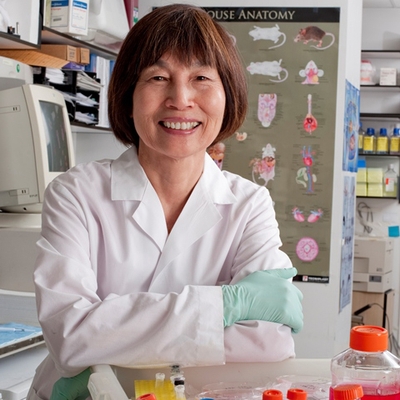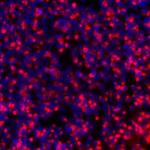
Research Topics
Dr. Cheng and her team are using multi-disciplinary approaches to understand the biology of thyroid hormone nuclear receptors (TR) and to elucidate the molecular actions of thyroid hormone receptor mutants in human disease. Dr. Cheng employs classical biochemistry, cell biology, immunology, and molecular biology methods in her studies. Additionally, she utilizes cutting-edge approaches such as single-cell RNA-seq, RNAScope, and GeoMX DSP to achieve her research goals. Her current research programs concentrate on the areas below.
Creation of mouse models to understand the molecular basis of resistance to thyroid hormone in humans (RTHβ) due to mutations of the thyroid hormone receptor β
To understand the molecular basis of resistance to thyroid hormone (RTHβ), we achieved an exciting breakthrough by creating the first Thrb knock-in mutant mouse. A mutation, TRβPV, derived from an RTH patient at NIH, was inserted into the Thrb gene locus which faithfully reproduced human RTHβ. The landmark study addressed several critical, clinically relevant issues. We showed unequivocally that RTHβ manifestations are the result of dominant negative action of mutant TRβ in vivo, which is due to recruitment of the corepressor NCOR1 by TRβ mutants. The variable phenotypic expression is dictated by tissue-dependent abundance of TRβ and TRalpha isoforms, by co-activators, by the presence of other Thrb alleles and by “gain-of-function” of TRβ mutants. Our creation of the ThrbPV mouse stimulated extensive global collaborative studies that have brought new insights into the molecular actions of TRβ in bone, the heart and vascular system, cochlear morphogenesis, neuronal development and functions, and lipid homeostasis. The creation of ThrbPV mouse significantly advanced our understanding of the in vivo pathogenetic actions of TRβ mutants and has impacted the clinical management of RTHβ patients.
Creation of animal models to elucidate the pathogenic actions causing resistance to thyroid hormone (RTH⍺) in humans due to mutation of the thyroid hormone receptor ⍺1
TR⍺1 mutations have never been identified in RTHβ patients and raised the fundamental issue of whether mutations of the THRA gene are associated with human diseases. We prepared a mutant mouse by targeting the identical PV mutation to the Thra gene locus (Thra1PV mouse). Extensive characterization of Thra1PV mice showed that the mutation resulted in dwarfism, bone defects, and reduced survival, distinct from RTHβ. Characterization of Thra1PV and ThrbPV mice predicted that mutations of the THRA gene would lead to human disease differing from RTHβ, proven to be true by the discovery of patients with mutations of the THRA gene. Thra1PV/+ mice have been used to elucidate the mechanisms by which TR⍺1 mutants impair erythropoiesis to cause anemia and weaken rectum smooth muscle contractility to cause constipation, as found in RTH⍺ patients.
We further developed novel germline transmittable thra mutations in zebrafish as RTH⍺ models to investigate TR⍺1 mutant action during development. Mutant zebrafish exhibit retarded growth and bradycardia as early as juveniles; these defects persist to adulthood, providing evidence that the deleterious actions of TR⍺1 mutants are conserved in zebrafish, mice, and humans. These mutant zebrafish will be used as a model for further analysis of TR⍺1 mutant action during development and for large-scale screening of therapeutic agents for RTH⍺.
Development of mouse models that spontaneously develop thyroid cancer
We made a remarkable discovery that homozygous ThrbPV/PVmice, as they age, spontaneously develop follicular thyroid carcinoma with pathological progression and frequent metastasis similar to human follicular thyroid cancer. The genetic basis for metastatic behavior of FTC is not clearly understood. Using ThrbPV/PV mice, we discovered that activation of tumor promoters such as cyclin D1, b-catenin, phosphatidylinositol 3-kinase (PI3K), AKT, steroid receptor coactivator-3, and pituitary tumor transforming gene and the repression of tumor suppressors such as peroxisome proliferator-activated receptor g (PPARg) drive FTC progression. In another more aggressive FTC mouse model (ThrbPV/PVPten+/- mice). We provided in vivo direct evidence to show, for the first time, that obesity is a risk factor in thyroid cancer by over-activating leptin-JAK2-STAT3 signaling which was blocked by metformin treatment. We further developed a mouse model that mimics anaplastic thyroid cancer (ATC) in humans, which has limited effective treatment (ThrbPV/PVKrasG12D mice). We identified cMYC as a driver in ATC progression and found JQ1, an inhibitor of the bromodomain and extraterminal (BET) domain proteins, suppresses transcription of cMYC to block ATC progression. BET inhibitors are being tested in clinical trial lung cancer, colorectal cancer, and multiple myeloma. Our findings raised the possibility that BET inhibitors could be tested for ATC in clinical trials.
Discovering that thyroid hormone receptors are tumor suppressors in thyroid cancer
Many studies have shown that silencing the expression of thyroid hormone receptor (TR) by promoter methylation or truncation/deletion of the TR genes are associated with the development of human cancers, including breast, liver, kidney, and thyroid cancer. In a series of studies, spanning more than 10 years, we have provided the compelling evidence that mutation of the C-terminus as found in the TRβPV mutant, functions as an oncogene to drive thyroid cancer progression, mammary tumorigenesis, and pituitary tumor development. The oncogenic actions of TRβ mutants are not limited to TRβPV; other sequences of C-terminal mutations of TRβ also function as oncogenes. The above findings show that loss of normal functions of TRβ by mutations results in oncogenic activity and support that wild-type TRβ acts as a tumor suppressor. Indeed, we found that reactivation of the silenced THRB gene delays thyroid cancer progression and that TRβ acts to inhibit thyroid tumorigenesis in vivo. Recently, we discovered that TRβ functions as a tumor suppressor by attenuating cancer stem-like cells activity in anaplastic thyroid cancer in vitro and in vivo. Suppression of cancer stem-like cells could partially account for the efficacy of the combined treatment of ATC patients with BRAF and MEK inhibitors, recently approved by the FDA. We demonstrated that reactivation of the silenced THRB gene by decitabine, approved for treatment of myelodysplastic syndromes and acute myeloid leukemia, is a potential novel therapy for ATC patients. Additionally, using single-cell transcriptomic analyses (scRNA-seq), we found that TRa1 induces the re-expression of the PAX8 gene, a critical thyroid differentiation transcription factor and that TR⍺1, shifts ATC towards a more differentiated state. The discovery that the two TRβ and TR⍺1 could function as tumor suppressors holds immense potential for novel cancer treatment. Small molecule agonists, gene therapy approaches, and combination therapies targeting TRs and oncogenic pathways are being explored in preclinical studies with clinical trials planned for the future.
Our collaborators are Drs. Paul Meltzer, Lalage Wakefield, Michael Kruhlak, Naris Nilubol, and Mitchell Ho, National Cancer Institute; Drs. Elijah Edmondson and Raj Chari, Frederick National Laboratory for Cancer Research; Dr. Zeng-jie Yang, Fox Chase Cancer Center, Philadelphia, PA, USA; Dr. Bert O’Malley, Baylor College of Medicine, Houston, TX, USA; Dr. Won Gu Kim, University of Ulsan College of MedicinE, Songpa-gu, Seoul, South Korea; Dr. Paul M Yen, Duke-NUS Graduate Medical School, Singapore; Dr. Anna Milanesi, VA Greater Los Angeles Healthcare System, Los Angeles, CA, USA; Dr. Lars Grøntved, University of Southern Denmark, Odense M, Denmark; Dr. Ge Wei, University of Macau, Taipa, Macau, China; and Dr. Hui Zhao, The Chinese University of Hong Kong, Hong Kong.
Biography
Dr. Sheue-yann Cheng obtained her Ph.D. from the University of California, San Francisco Medical Center. She received her postdoctoral training at the University of Chicago and the National Institute of Diabetes and Digestive and Kidney Diseases. She joined the NCI as a principal investigator in 1979 and was promoted to Section Chief in 1991. She was promoted to the rank of senior investigator in 2016. Dr. Cheng is well recognized nationally and internationally for her outstanding work in understanding the biology of thyroid hormone nuclear receptors and the molecular actions of mutant thyroid hormone receptors. For her scientific accomplishments, she was awarded the NIH Merit Award for outstanding achievements, the Scientific Achievement Award from the Chinese Medical and Health Association, the Charles Harkin Award of the NCI, the Sidney H. Ingbar Distinguished Lectureship Award of the American Thyroid Association, and the Abbott Thyroid Research Clinical Fellowship Mentor Award of The Endocrine Society. She is a recipient of John B. Stanbury Thyroid Pathophysiological Medal of the American Thyroid Association.She served as a regular member of the NIH Molecular and Cellular Endocrinology Study Session and as an advisor for Howard Hughes Medical Institute-NIH Research Scholars. She served as a Women Scientist Advisor of the Center of Cancer Research, NCI. Currently she is an Associate Editor of Thyroid, Associate Editor-in-Chief of the American Journal of Cancer Research, Associate Editor of Frontier-Endocrinology-Thyroid and also is on the Editorial Boards of several prominent journals. Dr. Cheng focuses on understanding the biology and molecular actions of thyroid hormone receptors in health and disease as described in her work above.
Selected Publications
- Enomoto K, Zhu X, Park S, Zhao L, Zhu YJ, Willingham MC, Qi J, Copland JA, Meltzer P, Cheng SY. Targeting MYC as a Therapeutic Intervention for Anaplastic Thyroid Cancer. J Clin Endocrinol Metab. 2017;102(7):2268-2280.
- Zhu X, Enomoto K, Zhao L, Zhu YJ, Willingham MC, Meltzer P, Qi J, Cheng SY. Bromodomain and Extraterminal Protein Inhibitor JQ1 Suppresses Thyroid Tumor Growth in a Mouse Model. Clin Cancer Res. 2017;23(2):430-440.
- Grøntved L, Waterfall JJ, Kim DW, Baek S, Sung MH, Zhao L, Park JW, Nielsen R, Walker RL, Zhu YJ, Meltzer PS, Hager GL, Cheng SY. Transcriptional activation by the thyroid hormone receptor through ligand-dependent receptor recruitment and chromatin remodelling. Nat Commun. 2015;6:7048.
- Fozzatti L, Kim DW, Park JW, Willingham MC, Hollenberg AN, Cheng SY. Nuclear receptor corepressor (NCOR1) regulates in vivo actions of a mutated thyroid hormone receptor α. Proc Natl Acad Sci U S A. 2013;110(19):7850-5.
- Fozzatti L, Lu C, Kim DW, Park JW, Astapova I, Gavrilova O, Willingham MC, Hollenberg AN, Cheng SY. Resistance to thyroid hormone is modulated in vivo by the nuclear receptor corepressor (NCOR1). Proc Natl Acad Sci U S A. 2011;108(42):17462-7.
Related Scientific Focus Areas




Molecular Biology and Biochemistry
View additional Principal Investigators in Molecular Biology and Biochemistry

This page was last updated on Wednesday, May 7, 2025